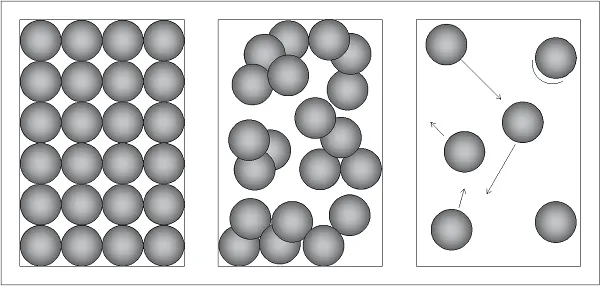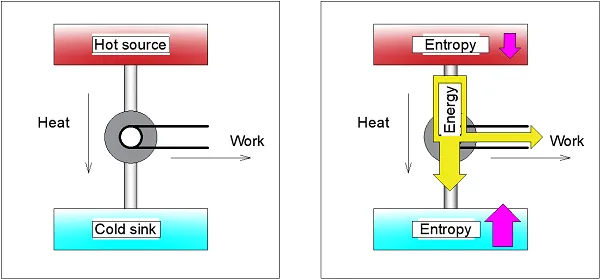
What is Entropy? Part 3: the way the universe will end
What is Entropy? Part 3; the way the universe will end
– by Paul Spoorenberg, 25/09/20
Ever wondered why heat never flows from cold to hot? Why we can never create a machine with 100% efficiency or how we know our past but not our future? It all has to do with an elusive concept called entropy.
One of the rules about entropy is that it cannot decrease. What is the effect of this on our everyday lives? To better understand let’s zoom in on the molecular basis of matter.
Part one: a simple definition
Part two: birth of the Second Law
Part three: the way the universe will end
Disorder on a molecular scale
Behold the molecules of solid body, a huge wall tightly packed together. Each molecule fits neatly into the grid and – except for some freely floating electrons – nothing moves. There is only vibration.
When the temperature rises the solid becomes a liquid. Molecules let go of the grid and start wobbling over each other. As the liquid flows, the atoms too start to get livelier.
Turn up the heat and the liquid becomes a gas composed of molecules that fly on a collision course and bounce off each other. This leaves more space in between the molecules and occupies a much larger volume.
The molecules have turned from an orderly state (solid) into a disorderly state (gas).
At the end of the nineteenth-century Austrian physicist Ludwig Boltzmann showed that entropy is a measure of disorder. The greater the disorder, the greater the entropy.

Three different states
So, entropy is not something physical which is added to the universe. It is the rise in disorder of all the energy and matter in the universe.
The entropy paradox
If the state of everything we know is degenerating, even on a cosmic scale, why do we see so much ‘order’ in our everyday life? Come the spring, plants will grow and young leaves sprout out of trees. In all seasons we see babies being born, cities built out of sand, wood and dust. Opinions are always being formed.
To resolve this paradox, you need to understand that change is not an island of activity in itself. Wherever order emerges, we must lift the curtain and see greater disorder being produced elsewhere.
To grasp this, I would like to use the analogy of the sneeze. A sneeze in a quiet library will be much louder than the same sneeze in a busy street, although a similar amount of energy is released. This bring us back to Clausius’ statement from our previous blog.
The sneeze in the library
Remember the steam engine from the eighteenth century? Energy leaves the hot source as heat, reducing its entropy (a sneeze in a loud street). Some of this energy is converted to work, which has no effect on the entropy. The rest heat is dumped in the cold sink, generating a lot of entropy. The cold sink acts as the quiet library. The increase in entropy is large even though a small amount of energy is discarded into it.

Entropy according to Clausius’ statement
This is happening everywhere around us. From the cooling machine in your fridge and the engine of your car to the steam turbine used to generate electricity and the sun hanging in the sky.
The heat death of the universe
Ancient cultures worshiped the Sun as the bringer of life, and they weren’t far wrong. The sun is the ultimate steam engine, bringing us photosynthesis, liquid water and much more besides. On the other hand, it is the driving force of universal corruption, acting as a massive entropy bomb.
Our blog title would assume we have a confident theory about how the universe will end but, truth be told, no one knows for sure. Following the increase of entropy, the dissipation of matter and energy goes on until our universe becomes so infinitely disordered that entropy can no longer increase and events come to an end.
This is called the heat death of the universe.
Some say that, because things cannot get any worse, nothing happens at all. Others believe that everything will reverse at this point, and that entropy starts to decrease as the space for energy and matter becomes more confining.
Anyway, all this cosmic disorder explains a lot. Next time my wife asks why the shed is such a mess or the desk covered in papers, I’ll say it’s not my fault. It’s just the universe thriving towards chaos.
Paul Spoorenberg | Sales Manager
Paul Spoorenberg has been working at H&H since 1994. During his career he gained valuable expertise in HVAC solutions for all kind of vessels in the Commercial, Offshore, Naval & Yacht segments.